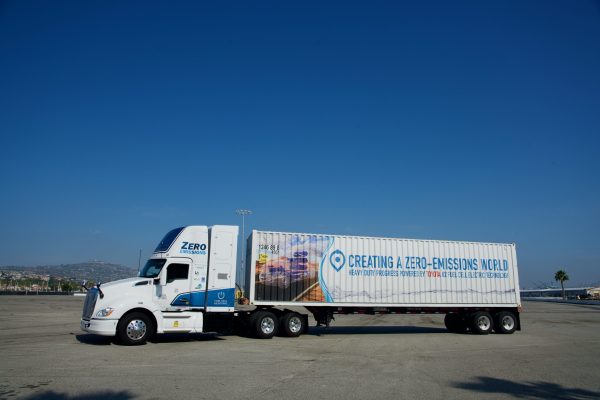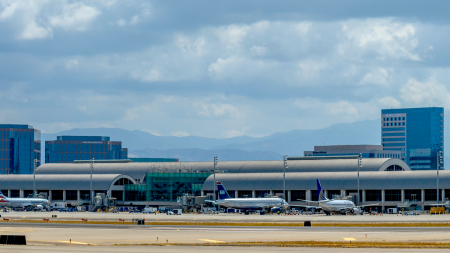The U.S. Department of Transportation granted $102 million to West Coast states for infrastructure to support zero-emission trucks that haul goods up and down Interstate 5 and other freight corridors, Gov. Gavin Newsom’s office announced Tuesday.
The $102 million is for new, publicly accessible electric charging stations and hydrogen fueling stations, with an additional $47 million going to other entities across California for electric vehicle infrastructure.
This round of funding follows $250 million recently announced for upgrading airports across California and supporting sustainable aviation fuel.
“The Biden-Harris Administration is helping California build our clean transportation infrastructure, faster,” Newsom said in a statement. “From installing truck chargers to improving our airports, this latest federal funding is another opportunity for America’s exports to look west for moving freight while fighting our climate crisis.”
According to Newsom’s office, the federal funding is essential to the governor’s “build more, faster agenda” to upgrade and de-carbonize infrastructure.
With funding from the federal Bipartisan Infrastructure Law, the West Coast Truck Charging and Fueling Corridor Project aims to increase zero-emission vehicles in the trucking and logistics industries.
According to the California Air Resources Board, 6% of the vehicles on California roads are trucks, but they spew more than 35% of transportation-generated nitrogen oxides, which cause smog, and 25% of roadway greenhouse gas emissions.
Construction of the charging stations is expected to begin in 2026, the governor’s office reported.
The new charging and fueling stations support California’s mandate for an increasing percentage of truck sales to be zero-emission vehicles.
“In 2021, Oregon and Washington became the second and third states after California to adopt this policy,” according to the governor’s office. “In 2023, one out of six new medium- and heavy-duty trucks sold in California were zero-emission vehicles, exceeding the state’s ZEV sales goals two years ahead of schedule.”
The new infrastructure plans also follow last year’s Advanced Clean Fleets standard, which requires fleets statewide to start a phased transition to zero-emission vehicles, and all new medium- and heavy-duty trucks sold in California will be ZEVs by 2036.
The new infrastructure via West Coast Truck Charging and Fueling Corridor Project adds to efforts in the three West Coast states to install light-duty emission-free infrastructure. The more than 14,000 direct current fast chargers in California, Oregon and Washington total a third of the nation’s publicly accessible fast chargers for light-duty vehicles, according to the governor’s office.
The federal funding for the freight truck infrastructure complements state-funded programs for emission-free trucks.
“California has distributed more than $780 million to help fleet operators purchase zero-emission trucks and the state’s Climate Commitment includes over $10 billion to accelerate the ZEV transition and build ZEV charging and fueling infrastructure,” according to Newsom’s office.
Earlier this month, the U.S. Department of Transportation announced more than $250 million for California airports and sustainable aviation fuels.
Airports are getting $51.6 million from the Airport Improvement Program, and $78.2 million via the Airport Infrastructure Grants program, according to the governor’s office. The funding can be used for airport planning, development, sustainability, terminal expansions, baggage system upgrades, safety enhancements and noise compatibility projects.
California companies are receiving more than $120 million from federal Fueling Aviation’s Sustainable Transition grants to help along California’s transition to more sustainable aviation fuels and cutting aviation emissions.







